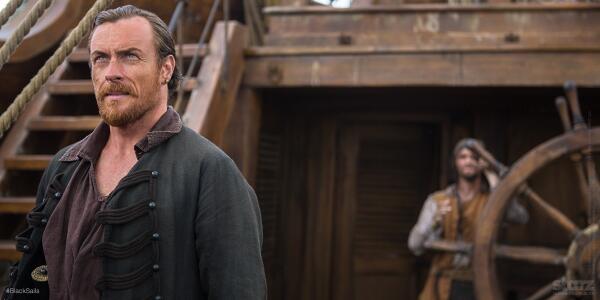Amazon Prime Instant Video TV review: Black Sails Season 1, Episode 1
Review Overview
Swashbuckling
7Brains
7David Farnor | On 04, Apr 2014
“It’s done now. Wouldn’t you agree?”
That’s Captain Flint after his band of pirates have taken over a ship. They blow things up, slashing through sailors, then he appears quietly from the side of the screen, blocking someone else’s murderous blade – a masked figure of mercy and intelligence rather a bloodthirsty vigilante.
It’s an understated entry for the legendary figure, who will go on to put the events of Treasure Island in motion – but no less impressive. Toby Stephens plays the pirate captain as more hard man than arr-ed man. He wears a determined, steely glare and a tight ponytail – not a parrot in sight. He’s the main reason to watch the Michael Bay-produced Starz show, which Amazon has pillaged for its latest Prime Instant Video exclusive.
Set two decades before the classic Treasure Island – not the Muppet version, sadly – Black Sails takes place during “The Golden Age of Piracy”. The introductory titles suggest outlaws who have declared “war against the whole world”, but the show soon takes down its own sensationalist posturing to fly a flag with far more substance.
From the moment Bear McCreary’s theme tune, complete with hurry gurdy, wails over the stylish credits, Jonathan E. Steinberg and Robert Levine make it clear that they are striving for something classier than Cutthroat Island. Blood, boobs and barbarians? They’re all present and correct, as you might expect from the broadcaster behind Spartacus and King Arthur, but it turns out the barbarians are not all that barbaric. Rather, they are men of democracy: captains are elected by crews and booty is stolen to be traded.
“We’re sick of being slaves,” a scarred crew member, Singleton, declares to their latest hostages. He explains that rather than be exploited for low wages, they split the profits equally between them. These, we discover, are more politicians than primitive savages.
On New Providence Island, where pirates have taken over, things are ordered and fair. Hannah New brings a ruthless authority to the society as Eleanor Guthrie, the money-lending daughter of head businessman Richard, who also runs a brothel – because brothers. Jessica Park Kennedy, meanwhile, brings raunchy danger as her lover, Max.
On the ship, Luke Arnold recalls a young Heath Ledger in the dashing role of young John Silver, who tricks his way into the position of Flint’s cook. He has in his possession a torn out scrap from a captain’s log book – a guide to the missing treasure of Spanish vessel Urca de Lima. That, it turns out, is Flint’s main target. If only he can get his crew to stop thinking of rebelling under Singleton.
A mysterious MacGuffin? The threat of mutiny? A treacherous infiltrator? All the pieces are in place for a promising eight-episode run. With Brit director Neil Marshall at the helm, the action sequences are enjoyably gritty affairs, with cannon smoke and splinters filling the screen. We even see a man beaten to death by hand. What suggests Black Sails has the mettle to make it across the ocean, though, is its sheer ambition. The opening chapter lasts an hour – and it feels much longer than the usual 45 minute US format. That’s partly due to a propensity for serious discussions of trading laws, which weighs down the boat’s swift passage, but also thanks to the huge cast. Tom Hopper appears likeably loyal as first mate Billy Bones, while Arnold and Stephens are both roguishly charming, but then there’s Zane McGowan as the shadowy Captain Vane and Sean Michael’s seemingly respectable Richard – not to mention the soldiers of the Royal Navy on all of their tails.
By the end of Episode 1, your brain will be reeling at the potential number of back-stabbers among the motley ensemble – a surprising challenge, but a welcome one. What could have been tits-out, swords-in trash appears to be aiming for something more complex. If Black Sails can navigate those waters successfully, this could be something far more enjoyable than the Pirates of the Caribbean-lite it promised to be. Forget Michael Bay’s producing credit: Black Sails does for pirates what historian Michael Hirst’s other show, Vikings (also on Amazon), did for Norsemen. The result is a fun, smart piece of swashbuckling; a relatively understated entry for the Starz series – but one that’s no less impressive.
Amazon is trying to stand out from Netflix with their own range of original and exclusive content. It’s not quite done yet – but in another seven episodes time, it might well be.
Black Sails is available to stream exclusively on Amazon Prime Video as part of a Prime membership or a £5.99 monthly subscription – or, if you would also like unlimited UK delivery and 350,000 eBooks available to borrow, as part of a £79 annual Amazon Prime membership.

















